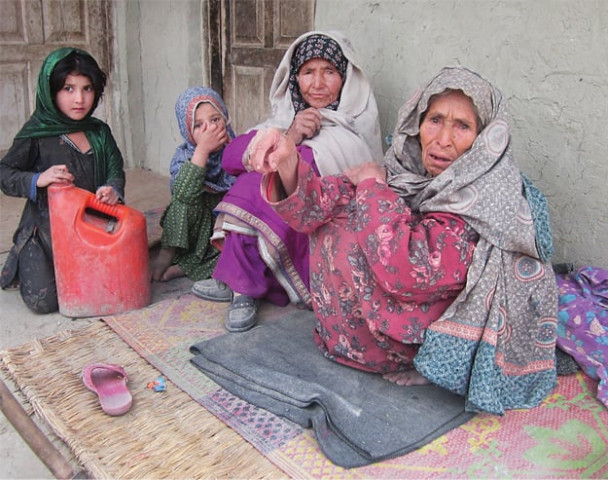Hoto disaster follow-up: Land giving way
Half a year on, still little relief for seriously affected by flooding.

Sakina Bibi lives in makeshift tents gripped in a perpetual fear of remaining homeless and dependent on aid for the rest of her life along with her family including her grandchildren. PHOTO: SHABBIR MIR/EXPRESS
Washed away
In April last, when River Skardu started flooding, its waters swept away many a dwelling that stood on an eroding land. The village, 20 metres from the river and built along the road that connects Gilgit with Skardu, was wiped out too. Bibi had to move into a tent, donated by the Pakistan Red Crescent Society.

PHOTO: SHABBIR MIR / EXPRESS
“We are helpless, homeless and I fear we will remain so forever,” she says, grief evidently etched across her wrinkled face.
According to official statistics, 58 houses in Hoto were destroyed or damaged by the summer floods. Since April, all the displaced people are either living in tents, or with relatives somewhere else.
The area was declared ‘flood-hit’ but as yet the cash-starved regional government has not been able to rehabilitate the homeless families on permanent basis.
Initially, each family received a mere Rs30,000 as government aid. On humanitarian grounds, the Aga Khan Rural Support Programme donated Rs300,000.
The Al-Khidmat Foundation was the last nongovernmental organisation to assist the displaced families. On the eve of Eidul Azha, it supplied edible items sufficient for a month. They included cooking oil, pulses, sugar and rice.
“This is the only aid we have received so far,” said Bibi, crouching in one of the two tents she shared with her two married sons, their wives and four grandchildren. “We are thankful, but it’s not enough to make a living out of. We’ve lost fields, home, trees and with all that, perhaps a reason for living.”
Winter’s coming
The onset of the harsh winter season is upon the villagers, and this is worrisome.
“The situation is quite disturbing and is likely to aggravate in the coming days,” says Tahir Rana, a senior manager in the Al-Khidmat Foundation who recently visited the village. “The families need warm clothing, blankets and medicines to counter the inevitable biting cold.”
From mid-November to mid-February, temperature is Skardu remains below 15 degrees centigrade. Right now, it has already plummeted to zero degrees.
Continuing erosion
Even today, the erosion continues, and the loss of land means increasing joblessness in Hoto.
Families can’t sustain crops, can’t feed their goats, and have no alternative means of earning.
Rana fears the main highway connecting Gilgit with Skardu may be the next target if the soil erosion cannot be halted.
Sadly, flooding, and ensuing erosion, is something this mountainous region has witnessed too many times. The Attabad Lake disaster in Hunza valley is a glaring example of such a disaster.
“Soil erosion generally takes place in areas where soil is loose and that’s certainly the case in Hoto village,” explains Professor Maisoor Ahmed of Karakoram International University. “It can be overcome by diverting the course of river flow, either by using boulders during winters or by planting trees.”
In this vein, the government claims that it has already initiated remedial measures.
“We have approached the federal flood commission for financial assistance, and will shortly be receiving Rs25 million for the Hoto disaster,” says Mohammad Ismail, the regional information minister who is also an engineer. “Many engineers from the commission are to visit the area soon.”
And yet, despite all this, the villagers find themselves in the same crippling position they were in months ago. Bibi stands before the remnants of her broken house, forlorn and hopeless.
Published in The Express Tribune, November 4th,2013.



















COMMENTS
Comments are moderated and generally will be posted if they are on-topic and not abusive.
For more information, please see our Comments FAQ